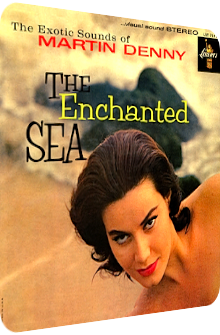
Martin Denny
The Enchanted Sea
1959
Released shortly before the turn of the decade, The Enchanted Sea is the last of Martin Denny's Exotica offerings of the 50's, and definitely one of his best, if not most coherent albums, its front cover graced once again by Miss Sandy Warner. Naturally, percussionist and bird caller Augie Colón, vibraphonist Julius Wechter and bassist Harvey Ragsdale are on board again, and as usual, their team play makes this a great record. Speaking of a great record: the premise of what makes an Exotica record so, well, exotic has been updated and fine-tuned by Denny, and the results of this sophisticated trial and error process culminate in this very album.
For one, Denny and his band decide to focus on soothing, literally enchanting sounds and dreamy song structures rather than on a tremendous wealth of different instruments, as previously presented on Exotica or Forbidden Island, for instance. Secondly, this leads to the big strength of the album: the coherent, harmonious presentation thanks to a small portion of unique, never heard before compositions by Denny and his co-composer Hal Johnson. Despite its occasional ventures into Far Eastern territories, The Enchanted Sea is surprisingly free of any local markers. No track title refers to a specific city or country. Instead, various elements or natural phenomena form the essence of this release. Rambling around the world is not important, at least not on this album. Now the credo can be shortly described with terms like phantasmagoria, bliss and harmony. The melodies swirl, the dreaminess is boosted to the maximum and the ensuing happiness revitalizes the moods and minds of those who can take it.
Trade Winds is the perfect point of departure, and although it was recorded at a studio in Hollywood, the omnipresent field recording of gentle ocean waves builds a great illusion of a tropical paradise. Denny and Wechter both play the shimmering mallet instruments on this original track, whereas Denny also plays an accompanying section on the piano later. The exotic percussion is strictly reduced, making room for the ocean waves and the gleaming sustain of the mallet instruments. This is one of those tracks that aren't all too catchy, there is no special point of interest embedded, and still the terrifically mellow unison of the last quavering reverberated tone of the song is eye-opening and lets the listener concentrate on the interplay and little tweaks of the band in a further listening session.
My Isle Of Golden Dreams is the singular Far Eastern song of the album with the respective clichéd tone sequences on a vibraphone-marimba coupling and complemental Chinese gongs. A surprising shift is the flowing change of harmonies during the song that all of a sudden minimizes the Japanese flavor in favor of a faux-Polynesian flavor of romance. Up next is one of Martin Denny's über-strongest interpretations ever! Hoagy Carmichael's Stardust gets a proper Denny treatment, and it is among Denny's five best songs he ever came up with. Glitzy hand cymbals, spiraling vibraphones, augmenting marimba backings and iridescent wind chimes altogether form a powerful galactic whirlwind that illuminates a quiet night in the Tropics. Denny's piano chords remain in the background all the time, hence putting the focus on the plasticity of the vibraphones. If I ever came across a guy who didn't like vibraphone music in particular or Exotica in general, I'd present Denny's version of Stardust. It is enchanting and the standout track of the album.
Song Of The Islands is another Denny/Johnson co-production with a faux-ship horn done on an alto flute, a short intersection of tribal chants, Colón's distant bird cries and Denny's piano in the spotlight, while Flotsam And Jetsam is the mandatory quirky tune that is found on every Denny album, I suppose. A rustic Honky Tonk piano theme has a close encounter with mercurial mallet instrument droplets of which the high marimba swirls are of particular incisiveness. The ditty soon morphs into a swinging entity, allowing Wechter to perform a freely flowing improvisation. I'm sure there are people who like short explorations like this, but the song definitely destroys the dreaminess that was previously built.
A rendition of Charles Trénet's 1943 classic Beyond The Sea (La Mer) needs to keep up the formerly mellow mood, and indeed, the band interprets it flawlessly. Launching off with mystical vibraphone notes, energetic cymbals and bird calls, Denny's vibraphone on the foreground as well as his cascading piano notes in the back let this album return to its dreamy glory, a mood that is further enhanced by a rendition of Leo Diamond's Off Shore, originally written in 1953 and presented here in a gorgeous version with scintillating vibraphone drops and their sparkling brethren, a careful double bass setup and the inclusion of further bird noises and ship horns. As usual, it is less about the melodies than the sound of the instruments themselves that evoke and maintain the dreaminess that is so welcome and strong om The Enchanted Sea.
Yet another rendition is presented by the band. Les Brown's and Ben Homer's Senimental Journey is stripped off its clichés and transformed into a mellifluous tropical piece that retains the galloping beat. A favorite big band piece, the brass sections are exchanged with various mallet instruments which play Japanese tone sequences at times, an unexpected but clever feature that alters the original in an imaginative way. Jack Pitman's Beyond The Reef is one of those classics that received a second life due to the Exotica movement, and although I like Arthur Lyman's take better, the piano-driven main melody of Denny's interpretation that is accompanied by scintillating vibraphone bleeps as well as an interesting human-made wind impression, possibly by Augie Colón, is equally splendid. This version is definitely on par with Lyman's, and it's just my personal preference that makes it my second choice. No harm done.
Robert Wright's Baubles, Bangles & Beads is presented in a tremendously glinting and brightly-lit version that mimics Denny's Stardust interpretation and kills Irv Cottler's take on his 1961 album Around The World In Percussion, while Denny's own Cross Current features the most successful equitable portions of piano melodies with vibraphone counterparts that evoke a quiet sunset over a beautiful island. I adore the colorfully ecstatic and, yes, melodramatic performance by Denny on his piano. The final title-giving piece The Enchanted Sea in 3/4 time, originally composed by Frank Metis and Randy Starr, features a melancholic ooh-ooh choir, distant ship signals and a tremendously haunting pre-X-Files whistled main melody. A rather bad outro, to my mind, as the warm, gentle atmosphere of the former tracks is sped up and transformed into a hastily produced ephemeral song.
Despite the disappointing closing track, I don't hide my deep affection for this particular work of Martin Denny. What I like tremendously, however, might be another listener's problem. The mood is utterly coherent and paradisiac, there is no stormy cloud or darker undertone on this album … quite a contrast to the opener Cobra off Forbidden Island with its menacing shawm and a threat-evoking title. Or take Exotica's oscillating variety into account, with Middle Eastern remnants and related fragments that are interwoven in an otherwise Polynesian context, whose quality as a benchmark is based on its rich selection of textures.
The Enchanted Sea is a totally different work of art, namely the first proper Exotica album that depicts the surroundings of a dreamy island in a cohesive manner, without venturing off too far by adding too many overly hasty, lively or quirky compositions. It is this very harmony that makes this album one of the strongest exotic entries of the 50's. Denny and his band already showed their skills and effervescent imagination time and again, making The Enchanted Sea an interesting counterpoint and the best possible endpoint of the Golden Age of 50's Exotica. Strongly recommended and, on a side note, perfectly adapted by the Gene Rains Group with their similarly titled dreamy nexus Far Across The Sea of 1961.
Exotica Review 076: Martin Denny – The Enchanted Sea (1959). Originally published on Jun. 2, 2012 at AmbientExotica.com.
